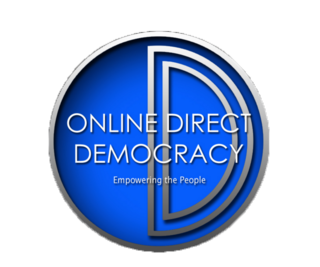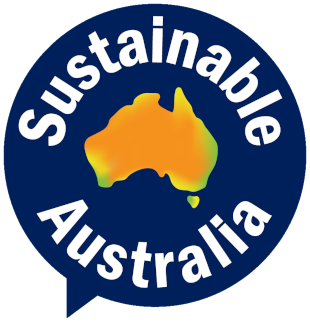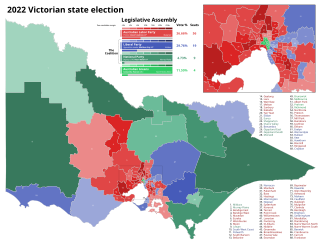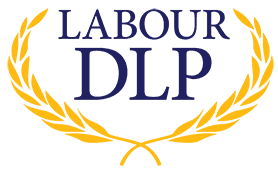
The Shooters, Fishers and Farmers Party (SFF) is a conservative Australian political party. It primarily advocates for increased funding and services for rural and regional Australia, protecting the right to farm, enhancing commercial and recreational fishing, and relaxing gun control for citizens.
A group voting ticket (GVT) is a shortcut for voters in a preferential voting system, where a voter can indicate support for a list of candidates instead of marking preferences for individual candidates. For multi-member electoral divisions with single transferable voting, a group or party registers a GVT before an election with the electoral commission. When a voter selects a group or party above the line on a ballot paper, their vote is distributed according to the registered GVT for that group.

The Libertarian Party (LP), formerly known as the Liberal Democratic Party (LDP), is an Australian political party founded in Canberra in 2001. The party espouses smaller government and supports policies that are based on classical liberal, libertarian principles, such as lower taxes, opposing restrictions on civil liberties, decentralisation, uranium mining, and the relaxation of smoking laws.

The Non-Custodial Parents Party was a minor political party in Australia registered between 1999 and 2020. It supported less government control of many aspects of daily family life, focusing on reform of family law and child support.

Online Direct Democracy – was a registered Australian political party. It was briefly named Climate Action! Immigration Action! Accountable Politicians! from January 2019 to September 2019, and had previously been known as Senator Online. The party was de-registered in December 2020.
Reason Australia, commonly referred to as the Reason Party or as simply Reason, was an Australian political party. Its leader, Fiona Patten, described the party as a "civil libertarian alternative". Patten was elected to the Victorian Legislative Council as at the 2018 state election in the Northern Metropolitan Region, after formerly being elected as a Sex Party member for the same seat in 2014. However, she lost re-election in 2022.

The Sustainable Australia Party (SAP), officially registered as Sustainable Australia Party – Universal Basic Income, is an Australian political party that was formed in 2010.

The 2014 Victorian state election, held on Saturday, 29 November 2014, was for the 58th Parliament of Victoria. All 88 seats in the Victorian Legislative Assembly and 40 seats in the Victorian Legislative Council were up for election. The incumbent centre-right Coalition minority government, led by Liberal Party leader and Premier Denis Napthine and National Party leader and Deputy Premier Peter Ryan, was defeated by the centre-left Labor Party opposition, led by Daniel Andrews. The Greens won two lower house seats, their first Legislative Assembly seats in a Victorian state election, whilst increasing their share of upper house seats. The new Andrews Ministry was sworn in on 4 December 2014.

The United Australia Party (UAP), formerly known as Clive Palmer's United Australia Party and the Palmer United Party (PUP), is an Australian political party formed by mining magnate Clive Palmer in April 2013. The party was deregistered by the Australian Electoral Commission in 2017, revived and re-registered in 2018, and voluntarily deregistered in 2022. The party fielded candidates in all 150 House of Representatives seats at the 2013 federal election. Palmer, the party's leader, was elected to the Division of Fairfax and it reached a peak of three senators following the rerun of the Western Australian senate election in 2014. When the party was revived under its original name in 2018, it was represented by ex-One Nation senator Brian Burston in the federal parliament.
The Voluntary Euthanasia Party (VEP) was a minor political party in Australia, founded in early 2013 by Corey McCann to advocate for legislative change to allow voluntary euthanasia in Australia. The party's inception was strongly supported by Dr Philip Nitschke, director of Exit International and Richard Mills, then President of Dying with Dignity NSW.

Vote 1 Local Jobs was a minor political party in the state of Victoria, Australia. It was registered as a political party by the Victorian Electoral Commission on 3 November 2014, in time for the 2014 state election.

Yellow Vest Australia (YVA), until 9 April 2019 known as the Australian Liberty Alliance (ALA), was a minor right-wing to far-right political party in Australia. The party was founded by members of the Q Society and has been described as the political wing of Q Society. The leader was Debbie Robinson (President), who was also national president of the Q Society. On 4 September 2020, the Australian Electoral Commission removed the Yellow Vest Australia from the registered political party list.

A by-election for the seat of Polwarth in the Victorian Legislative Assembly was held on 31 October 2015. The by-election was triggered by the resignation of Terry Mulder on 3 September 2015. Former Premier of Victoria, Denis Napthine, resigned his seat representing the adjacent district of South-West Coast on the same day as Mulder. The by-election for South-West Coast was held on the same day.

The 2020 Northern Territory general election was held on 22 August 2020 to elect all 25 members of the Legislative Assembly in the unicameral Northern Territory Parliament.
The Australian Sex Party was an Australian political party founded in 2009 in response to concerns over the purported increasing influence of religion in Australian politics. The party was born out of an adult-industry lobby group, the Eros Association. Its leader, Fiona Patten, was formerly the association's CEO.

The Victorian Socialists (VS) is an Australian political party based in the state of Victoria.

The 2022 Victorian state election was held on Saturday, 26 November 2022 to elect the 60th Parliament of Victoria. All 88 seats in the Legislative Assembly and all 40 seats in the Legislative Council were up for election at the time the writs were issued, however the election in the district of Narracan was deferred due to the death of a candidate.
The Freedom Party of Victoria is a right-wing micro party registered in the Australian state of Victoria. Founded and registered in 2022, by anti-vaxxer and alt-right blogger Morgan Jonas, the party ran in the 2022 Victorian state election on an anti-lockdown and anti-vaccine mandate platform, but was unsuccessful in winning any seats.

The 2026 Victorian state election is expected to be held on 28 November 2026 to elect the 61st Parliament of Victoria. All 88 seats in the Legislative Assembly and all 40 seats in the Legislative Council will be up for election, presuming there are no new electorates added in a redistribution.

The Democratic Labour Party (DLP), formerly known as the Australian Labor Party (Anti-Communist), is an Australian political party which broke off from the Australian Labor Party (ALP) as a result of the 1955 ALP split. Following the partial dissolution of the party as a result of many members re-joining the ALP after the departure of Gough Whitlam in 1977, the DLP was re-formed by members of the original Democratic Labor Party















